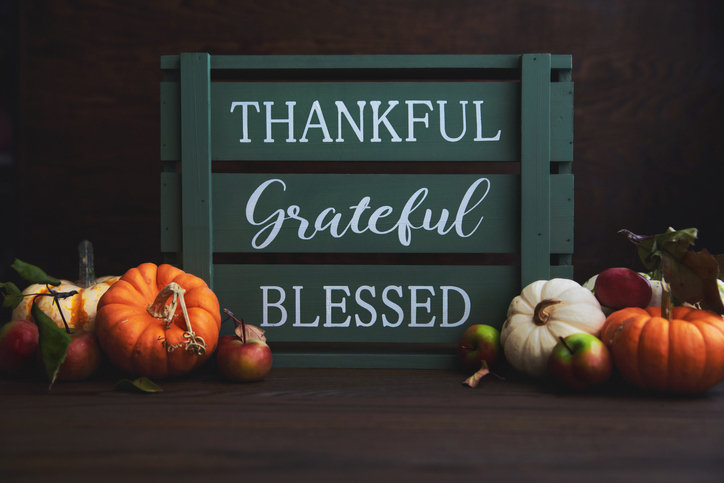Think of three things you are grateful for.
It’s okay if it takes you a few moments. Even if you think of yourself as someone who remembers to count your blessings, the odds are pretty good you do not literally count them all that often.
We are confident, however, that if you sit quietly for a moment or two, it won’t be too difficult to come up with three things for which you feel grateful.
Got ’em? Great. Consider writing them down or typing them up.
If you take that extra step of making a brief record of what you are grateful for in this moment, you will have started a gratitude journal (one of a number of kinds of journals that can be useful to a person in recovery). If you do it again tomorrow, you will be well on your way to establishing a new habit of calling your gratitude to mind.
That new habit can support your recovery from a substance use disorder. And that’s certainly something to be grateful for.
Let’s take a closer look at gratitude as it relates to your recovery.
Feeling Thankful Can Remind You of Your Reasons to Stay Sober
It almost goes without saying that day-to-day life can be pretty darn difficult. And it can be even more difficult if you are working to maintain your sobriety. Sometimes the struggles—including cravings, difficult emotions, excessive stress, and more—can make it seem like you can’t possibly stay sober. Heck, those things can even make you feel as though you don’t want to stay sober.
That feeling, of course, sets you up for a relapse. So it is a good idea to make a conscious decision to shift your train of thought to another track—the gratitude track.
When you take a few moments to name three things you are grateful for, you interrupt the thoughts that may have been headed in a negative direction. The things for which you are thankful can remind you of all the reasons you sought out treatment for a substance use disorder and all you might be giving up if you were to relapse.
You Can Be Grateful for Things Big and Small
It is pretty easy to be grateful when something positive and significant happens in our lives. You might feel grateful after getting a promotion. You might feel grateful watching your child succeed at something important to them. You might feel grateful after a mishap that could have led to injury to you or a loved one—but didn’t.
Those sorts of moments are, of course, worthy of your grateful feelings. But so, too, are many of the smaller moments that make up our daily lives.
A great cup of coffee. A quick phone call with a friend. A project completed. A snuggle with a pet. A couple of hours spent enjoying a movie or a book or a puzzle or a conversation. All of those things are worth noting—while they are happening and in your gratitude journal. Also, you can be ongoingly grateful for these kinds of things—meaning that great cup of coffee you have each day is a perfectly fine thing to put into your journal regularly. Repetition of something good, after all, does not mean that something is worth less gratitude than the very first time you experienced it.
Also, you should remember that a gratitude journal is yours alone. It is not a test or an assignment or something you have to share with others. So, if you are having trouble thinking of three things you feel grateful about, write down two—or write down one. And don’t beat yourself up if you let a day or two or three (or more) go by without jotting your list down. Your gratitude journal will still be there for you when you are ready to return to it.
Important Note: Feeling Grateful Isn’t a Standalone Recovery Strategy
Have you ever noticed that some people seem to think that if you were just, for example, more grateful, many of your problems and challenges would somehow evaporate? We are not saying that at all.
What we are saying is that a spirit of gratitude can be one part of your ongoing approach to the recovery journey. Remembering what you are grateful for can be a real motivator—and sometimes that motivation is exactly what you need to get through a rough patch. Think of gratitude not as a cure-all, but as one of many tools in your recovery tool belt.
We Would Be Grateful for the Chance to Help
At The Aviary Recovery Center near St. Louis, MO, we are grateful to be engaged in work that can truly change lives for the better. Through personalized care delivered with empathy and expertise, we can help you regain—and maintain your sobriety. If you are ready to make a change, we are ready to help.










